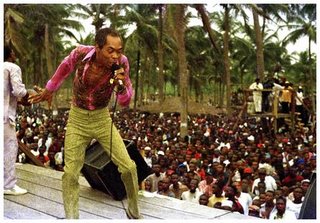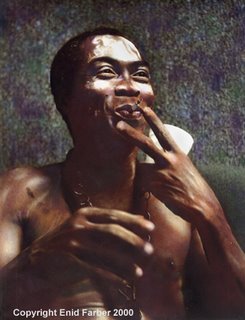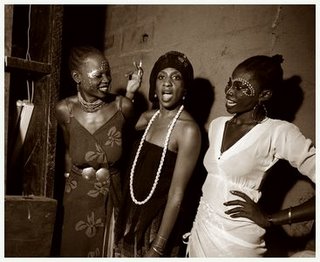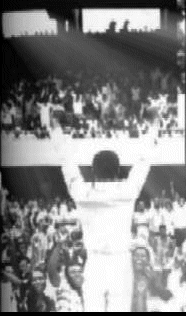
I remember when Fela came out of Prison in the eighties. His first release after spending 20 months in prison was Teacher don't teach me nonsense proving he was still defiant, despite all the attempts of succesive Nigerian Governments to keep him quiet.
Where man and governments failed to keep him gagged, AIDS succeeded. In 1997 at the young age of 58, Fela passed away and his brother the former Nigerian Minister for health announced his death to the Nation and the World.
I wish Fela had lived another 20 years to excite us with his defiant songs and potent lyrics. I wonder what he would have made of Obasanjo & Yar Adua's regimes.
BFI Southbank are showing the movie "Music is the Weapon" tomorrow from 1:30pm. The film is a documentary featuring interviews with Fela and some of his performances at the "Shrine". For more information about the showing click here. I certainly recommend you make it down there if you can, in memory of the legend that was Fela Anikulapo Kuti - Baba 70.
(A Tribute to Fela)
This is a tribute to the music, life and times of the Late Fela Anikulapo Kuti (Oct. 15, 1938 - Aug. 2, 1997)
Ironically, a talk is being held today at the National Theatre, Iganmu, Lagos titled Felaversation which is designed to celebrate the fact that "Nigerian intellectuals have, at last, responded to the challenges posed by their counterparts from the West and Europe on the issue of articulating the epochal contribution of one of Africa's leading cultural icon, Fela Anikulapo-Kuti to world culture. "
More info on Felaversation at Lagos Live. Okay, so maybe it wasn't ironic, just convenient for me to tribute to Fela!
The event is in honour of Benson Idonije, who was the very first manager of Fela Kuti when he returned to Nigeria in the 50s .
"For Fela Anikulapo – Kuti, the only losers are the governments, security operatives and individuals who tortured, humiliated and tried to destroy him over the years, otherwise how can anyone explain the popularity of Fela, nine years after he reportedly died of HIV-AIDS?." "77 albums, 27 wives, over two hundred court appearances. Harassed, beaten, tortured, jailed. Twice-born father of Afro-beat. Spiritualist. Pan-Africanist. Commune king. Composer, saxophonist, keyboardist, vocalist, dancer. Would-be candidate for the Nigerian presidency. There will never be another like him."

Mos Def, in 2003 said -- "Fela Anikulapo-Kuti was James Brown, Huey Newton, Rick James, Bob Marley, Duke Ellington and ODB all rolled up in one black African fist. The protest artist as a real live, awake and hungry human being. Africa's original rock superstar."

I give you Fela's lifestory in bullets and some never before seen pictures -- enjoy!
- He was born in 1938 in Abeokuta into a Christian family.
- His Mother, Funmilayo Ransome-Kuti was a huge influence on his life. And was a political activist – she was the first voice to speak out for women's rights earning them the right to vote and earning herself the Lenin Peace prize in the early sixties.
- Fela’s music legacy began in 1954 when he met his life-long friend Jimo Kombi Braimah (JK) who was a singer for a local band in Lagos called The Cool Cats.
- He studied music at Trinity College, London as opposed to his initial intended course, medicine.
- He and JK eventually formed a band in London called Koola Lobitos which performed at youth parties and jazz clubs.

- Fela met and married his first wife in London during this period - Remi Taylor, the daughter of a Nigerian father and Black American mother.
- With heightened purpose, a new energy and a new sound, Fela returned to Lagos where he changed the name of his band to Africa 70 with a new energy and new sound, and began to have hits.
- He opened his new club - The Shrine, and started his own commune that would later become the Kalakuta Republic.
- Fela had become a marijuana smoker of epic proportions. Besides smoking giant joints filled with igbo (Indian hemp), Fela had now developed his own marijuana recipe, which he called goro.
- On April 30, 1974, the commune was raided and Fela was arrested for possession of marijuana. Released on bail, he returned to his compound and re-named it "Kalakuta Republic.
- In February of 1977, about 1,000 members of the military went to Kalakuta Republic, blazed through the electric fence, set fires, brutally beat everyone in sight, raped any number of the many women who lived there, and threw Fela's 77 year old mother out of a window (which eventually resulted in her death). The whole of Kalakuta Republic was burned to the ground.
- After a month in prison, Fela was taken to court and charged. A counter attack by Fela was thrown out of court a year later, leaving him no compensation and calling him a hooligan as well as maintaining that the Kalakuta Republic was burned by "unknown soldiers" (hence the title of 1979's album "Unknown Soldier").
- Back in Lagos Fela did something that still to this day raises many eyebrows. In one ceremony, he married every one of his dancers and singers, calling them his "Queens," and giving them all the name of Anikulapo-Kuti. It was the first anniversary of the burning of the Kalakuta Republic.
- He has said that this was the happiest day of his life, but as seemed to be so often in his life, it was to be very short lived.
- Less than two months later his mother died as a direct result of the wounds incurred after being thrown from a window by the military a year earlier.
- The devastated Fela announced to everyone that he intended to deposit his mother's coffin outside the Dodan Barracks - residence of the dictator Olusegun Obesanjo (who had ordered the 1,000 strong raid on Kalakuta Republic) and so he did.
- In 1979 he put himself forward for President in Nigeria's first elections for more than a decade but his candidature was refused.
- At this time, Fela created a new band called "Egypt 80" and continued to record albums and tour the country.
- In 1983 he again ran for President but was again attacked by police, who threw him in prison on a dubious charge of currency smuggling.
- After twenty months, the regime changed once again and Fela was released from prison. On Fela's release he divorced his twelve remaining wives.
- Fela performed in Giants Stadium in New Jersey as part of the Amnesty International "Conspiracy of Hope" concert, sharing the bill with Bono, Carlos Santana, and The Neville Brothers.
- It was announced that he died on August 2, 1997 in Lagos, Nigeria of an AIDS-related heart failure.
That is my tribute to Fela in a nutshell....more stuff to come in a few months, I think you've had about enough of him to last you!
p.s. For some classic Fela quotes, click here!





























No comments:
Post a Comment